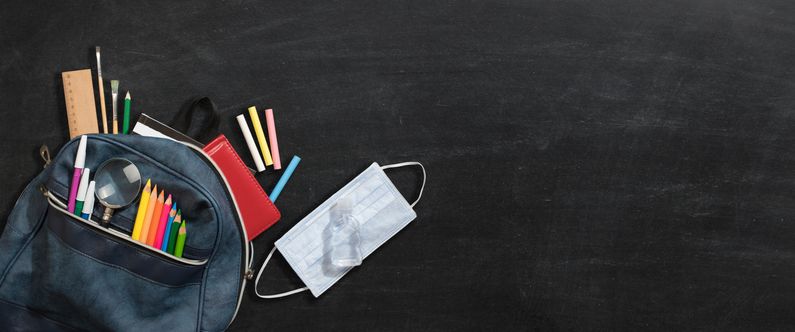Back to school during COVID-19

Back to school during COVID-19: What's different this semester?
The COVID-19 pandemic has caused major upheaval and going back to school is quite different from the way it used to be for millions of children worldwide. The new school year has begun albeit with uncertainty in the minds of parents and children. School reopening is important for students’ social and psychological wellbeing and allows students continuity in their education and progression to the next level. It also benefits society as parents can begin to go back to work as offices start to reopen and the workforce returns to physical office spaces.
In Qatar, schools will follow a blended model of in-person and remote learning for the first semester in the new academic year. It is possible that schools may have to close temporarily for a period of time as the pandemic continues to evolve. Let’s support the government authorities and the school administrators and follow recommended guidelines to ensure that our children remain safe and healthy. Here are a few tips to help prepare your child for what’s going to be different this semester.
Continue to support your child’s remote/online learning
In Qatar, with the school capacity restricted to 30 percent in-person student attendance on any given day, your child will be spending a considerable amount of time learning online.
Here is what you can do to help your child succeed in the virtual learning environment:
- Maintain a designated workspace: With many parents working remotely and students learning online, it is important to create separate, quiet workstations for both parents and children where possible. This will enable the child to focus and learn better and alleviate distractions.
- Follow the school routine throughout the week: On days when your child does not have to go to school, stick to the same routine rather than letting your child sleep in. A predictable routine is important to maintain expectations among children and also helps reduce morning stress for parents.
- Ask for help: Reflect on the Spring semester after the onset of COVID-19 and identify areas where your child might need extra help or support. Plan ahead and don't shy away from asking for help. Reach out to teachers, other parents and students to schedule weekly homework, study or tutoring sessions.
- Focus on physical activity: Encourage your child to engage in physical activity at least few times a week. Set limits on screen time.
- Talk to your child about how they feel: Each child is unique. Encourage open communication with your children about the positive and negative aspects of online learning. Ask open ended questions to gauge how they feel about this experience.
Follow precautions while using the school bus
During in-person school days, it is preferrable to use personal transport for drop off and pick up if possible. If your child will be using the school bus, encourage your child to wear a mask, practice good respiratory and hand hygiene and only sit in the assigned seat.
Practice good respiratory and hand hygiene
While children and adolescents up to 18 years of age represent 1 to 3 percent of reported COVID-19 infections as per the World Health Organization, their exposure to other people in school and other community settings is sizeable. Hence, we should ensure children continue to practice preventive measures like wearing a mask, good respiratory and hand hygiene as well as physical distancing.
Wear a mask/face covering at school
Masks offer important protection to our children. As per WHO, children who are in general good health can wear a non-medical or fabric mask. The Ministry of Public Health in Qatar's guidelines for children are as below:
- Cloth/fabric masks are acceptable, and children may find them more comfortable.
- Students from Grade 7 and above must wear face masks at all times.
- Grades 5 and 6 students are advised to wear masks.
- Students in Grades 1 to 4 should wear masks while in school corridors.
- If parents wish to have their children in earlier elementary years to wear masks inside the class, it is acceptable.
Where used, masks should be worn, cared for and disposed of properly. Parents and school staff should supervise and instruct students on how to put on, take off and safely wear masks. Children should not wear a mask when playing sports or doing physical activities so that it doesn’t compromise their breathing.
Sources: Parents | World Health Organization: Schools and COVID-19 | Ministry of Public Health | World Health Organization: Children and masks related to COVID-19